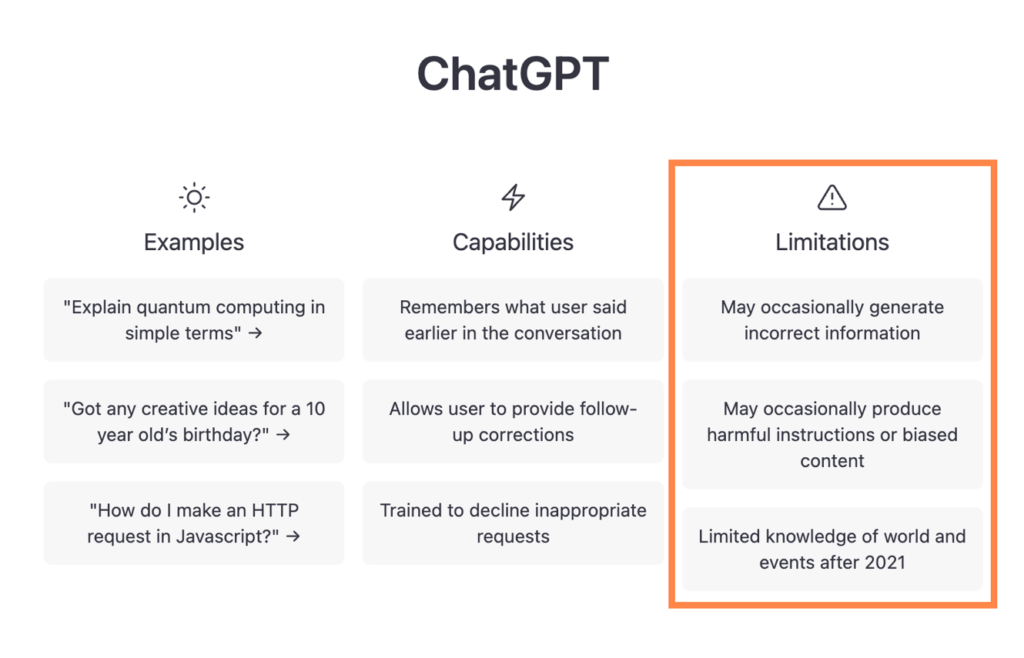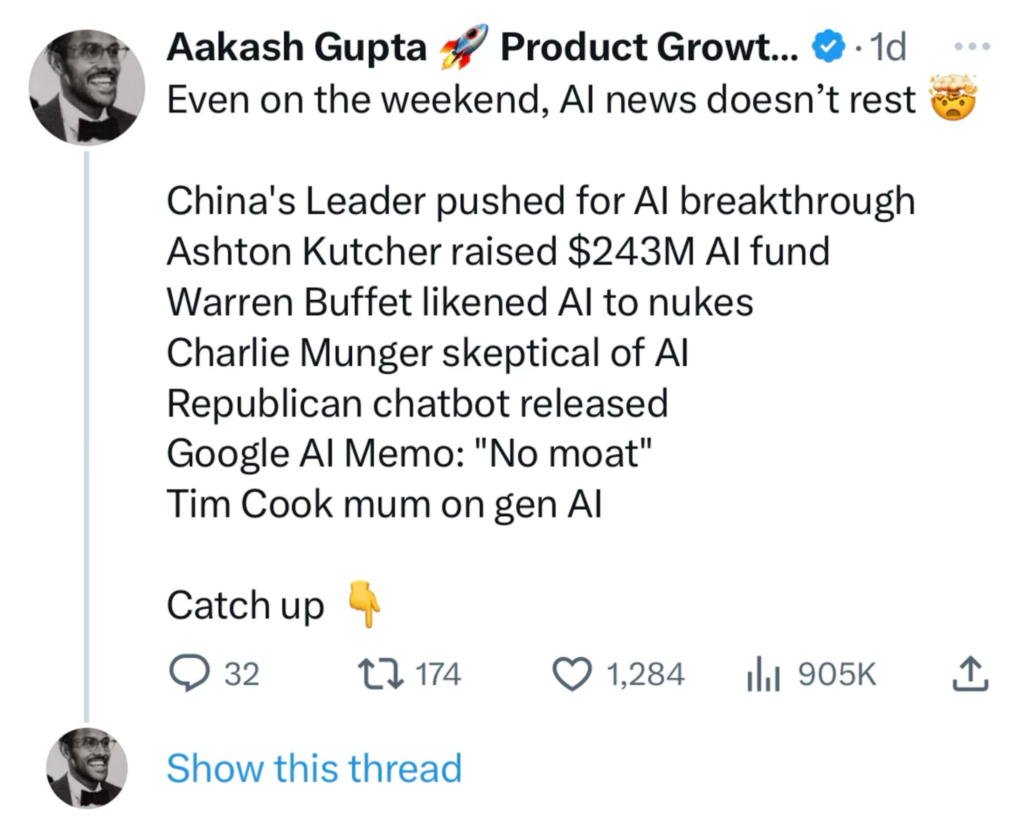Is anyone else feeling a bit of overwhelm — and maybe even a dash of anxiety — about artificial intelligence and large language models (LLM) like ChatGPT? Every single day, it seems like there are new headlines rolling out that are equal parts “look at what’s possible†and doomsday rhetoric.
- Artificial intelligence has the potential to help mitigate grading bias.
- AI could replace “the equivalent of 300 million jobs†in future
- Just kidding, your job is “(probably) safe from artificial intelligenceâ€
- “The Godfather of AI†has left Google warning of danger ahead
- This tech support team got better at their job and became less likely to quit after adopting ChatGPT
And that’s only the tip of the iceberg — for months, the onslaught of AI news has kept on coming. We’ve also been witnessing first-hand the true power of AI, adding credibility to many of the headlines we’re seeing.
🔎 Related: Go behind the scenes of the Independent Business Podcast
For example, Levi is testing AI-generated models to “increase diversity†in a way that’s reportedly more sustainable. AI headshot generators are cropping up everywhere. Then there’s the artist who rejected a Sony World Photography Award because their submission was AI-generated … but more on that little story later.
With this context as a savvy independent business owner, it’s no wonder you’re likely asking yourself:
“How is AI going to impact my business?†Or, maybe even, “Is AI going to put me out of my job? Am I even going to have a job five years from now?â€
@smallbiznatalie Change is an inevitable part of running a small business. That much I know.
♬ original sound – Natalie Franke
My answer to that question has changed
I’ll be the first to admit that my perspective on AI has shifted in recent months. I’ve always thought this conversation around AI and ChatGPT is essential, but that’s even truer now. Then, when ChatGPT 4 rolled around and I started playing with it, I started to catch the vision of what others were saying.
For example, my first “ah ha!†moment came when I realized I could ask ChatGPT how it wanted to be prompted. I asked what was the best way to prompt it for marketing copy, to which it replied with a killer template I could use. Then I was able to ask it to adapt that copy to multiple platforms, based on specific parameters. Nailed that, too.
🔎 Related: 5 undeniable independent business trends you can’t ignore
It was both exciting and somewhat panic-inducing. I could envision scenarios in which someone might choose AI over hiring an entry-level social media manager. Maybe not today, the technology is still being refined … but that reality doesn’t feel as far off as it used to be.
I also leaned on ChatGPT to help negotiate lease terms for my new studio. Seriously, I had to renegotiate a few terms of a lease prior to signing, and I asked it to help me draft a persuasive email with my change requests. After three small edits, I fired it off. The reply from my new landlord?
“I totally see your point, we’ll change that immediately for you.â€
Whoa.
So, is your job under threat from AI?
The short answer is no, it’s not. However, will you be out of the jobs you’re doing today? Probably, yes. While that may seem scary at first to some, I care too much about you all to pretend that AI is a fad that can be swept under the rug, no matter what it is you do or sell.
While I don’t totally agree with most of the extreme predictions out there surrounding job loss due to AI, a recent study from the University of Pennsylvania highlights a nuanced stance we should all be paying attention to:
“Our findings indicate that approximately 80% of the U.S. workforce could have at least 10% of their work tasks affected by the introduction of GPTs, while around 19% of workers may see at least 50% of their tasks impacted … The influence spans all wage levels, with higher-income jobs potentially facing greater exposure.â€
If you’re in the photography space, this AI conversation can feel much more complex. Let’s go back to that big story I mentioned earlier about Boris Eldagsen, the artist who refused a top prize from Sony over an AI-generated photo.
Eldagsen’s intention all along was to bring visibility to this issue in the hopes of forcing the creation of separate contests for AI-created art:
“Thank you for selecting my image and making this a historic moment, as it is the first AI generated image to win in a prestigious international PHOTOGRAPHY competition. How many of you knew or suspected that it was AI generated? Something about this doesn’t feel right, does it?
AI images and photography should not compete with each other in an award like this. They are different entities. AI is not photography. Therefore I will not accept the award.”
Although he insists he doesn’t view AI as an existential threat that will “sideline humans,†this story underscores how these conversations about AI aren’t some futuristic abstraction.
The “future†of AI is already happening.
In fact, while the AI headline domination parade is a more recent trend, AI isn’t really that new. For instance, in 2019, Forbes introduced an AI-powered CMS called Bertie to create raw, unpolished “first drafts†for writers, to minimize “blank page syndrome†blocks in the creative process.
Is the technology perfect? Most definitely not. Even ChatGPT comes with clear warnings about data limitations, biases and more …

But it’s good enough that you can’t afford to wait any longer to dive in.
You have to lean in now, you can’t wait
Although AI is still very much in its infancy, the story of AI is being written right now, at a breakneck pace …

Also, unlike other trends that have come (and, in some cases, gone) over the past 10 years, AI is an undeniably disruptive marvel that will force all of us humans to adapt at a faster rate than we are used to, when it comes to adopting any sort of innovation — particularly in our independent businesses.
🔎 Related: You don’t want to focus on clientflow, but your life depends on it
That means you can’t be afraid of it.
You can’t keep putting it off.
Right here, right now is the moment when you need to step up to determine the future success of your business or your career.
Now, when I say “lean in,†by no means am I suggesting you should force yourself to become an absolute AI ninja overnight. Not at all. My challenge to you is to start playing with it and experimenting with what’s possible. Start familiarizing yourself with the tools that are coming out and what’s happening in the world around you.
Your goal today is to explore AI
“Where in my life do I procrastinate that I can automate or streamline with the integration of AI?â€
You might be surprised what your answers are. For instance, I talked to someone recently who revealed they lean on ChatGPT to create meal plans for her family every single week, based on specific requests — â€This week, we don’t want any fish on the menu†or “Include recipes with tomatoes.â€
🔎 Related: How to set client expectations in the instant gratification era
Once the meal plan is set, she asks ChatGPT for recipe links, bulleted grocery lists based on those recipes, and more. Just like that, a tedious, 90-minute task is completed in 10-15 minutes.
Don’t go to extremes just yet, though …
Yes, stay on top of what’s happening and start experimenting with AI tools now. But I also want to be clear on what I’m not telling you to do:
- Fire anyone and replace them with robots
- Fully outsource (with zero oversight) tasks to AI
- Try to learn and do it all at once
Your only AI mandate for your independent business is to learn. Learn and understand how these tools work. Explore how they can potentially take certain tasks off your plate, or at least make them more efficient to complete.
We’re entering an entirely new world
Am I worried about AI becoming sentient and taking over? Not really. Right now, I’m more concerned about how to adapt AI in my daily life and business. There is so much to learn and still so much that remains uncertain.
Just think about how we used to talk about the internet when it first came around …
While it is understandably kind of hilarious to see the antiquated and short-sighted ways in which we talked about the internet years ago, think about how far we’ve come since then.
More importantly, realize that the rate at which AI will advance will far surpass anything we experienced when the internet came roaring into existence. We’ll see advancements faster. We’ll experience economic shifts faster.
🔎 Related: Gutsy, the 2nd book from Natalie Franke now available for preorder
So, instead of asking yourself, “Is AI going to replace me?â€
Try, “How can AI augment what I’m doing right now?â€
That subtle shift in your thinking can make all the difference in your ability to maintain a competitive edge within your independent business as AI continues its meteoric rise.
Leave a Reply Cancel reply
© 2023 Natalie Franke
/
/
/
/
/